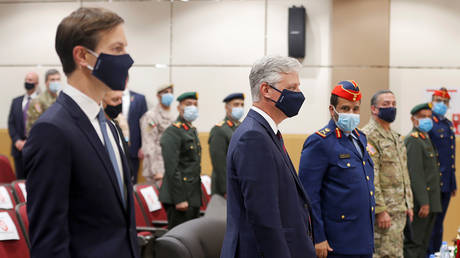
The United Arab Emirates’ Minister of State for Foreign Affairs Anwar Gargash says the decision to normalize ties with Israel was “the way forward” for the whole region, but many disagree with his view.
The move has “broken the psychological barrier,” Gargash said on Tuesday, adding that it also created more leverage for different players. In particular, he said, Israel suspending its planned annexation of Palestinian territory would stop the two-state solution being undermined. A strategic breakthrough is needed, he noted, but admitted “it will not happen overnight.”
Gargash also hailed the presence of the United States as a mediator of the UAE’s deal to mend relations with Israel, which he said, assured him that the suspension of further annexation of Palestinian lands will hold.
The minister said it was not the time to revise the Arab Peace initiative, and that it remains the cornerstone of the country’s commitment to the Palestinian cause.
On Tuesday the UAE and Bahrain will sign agreements toward normalizing ties with Israel. US President Donald Trump is hosting a ceremony at the White House, to be attended by Israeli PM Benjamin Netanyahu and the foreign ministers of Bahrain and the UAE. It will be the first time Arab nations have established relations with Israel since Egypt in 1979 and Jordan in 1994.
Amid his presidential re-election campaign, Trump last month helped broker the accord, under which Israel agreed to suspend its planned annexation of areas of the occupied West Bank.
However, despite the UAE foreign minister’s optimism, “breaking the psychological barrier” is perceived differently by many regional players. Some analysts see Israel’s peace deals with the UAE and Bahrain as a strategic realignment of Middle Eastern countries against Iran. Gargash even had to explain in August that “the UAE-Israeli peace treaty is a sovereign decision not directed at Iran.” He added that the UAE will not accept interference in its affairs, after Tehran blasted the deal. Iran later also slammed Bahrain’s ‘shameful’ move.
In Israel, Netanyahu signaled on Monday that the deals with the two Gulf Arab states may still be works in progress. The agreements come at a difficult time for the Israeli PM as he faces criticism at home of his handling of the coronavirus crisis and a corruption trial on charges of bribery, fraud and breach of trust. Netanyahu denies any wrongdoing, saying the trial is a leftist political witch-hunt, but the accusations have already led to massive street protests.
Many Palestinians feel the new Israeli accords have left them abandoned by some Arab allies. The Palestinian leaders have denounced the Arab rapprochement with Israel as a betrayal of their cause, even though the annexation plans are being put on hold. The Palestinian factions unanimously rejected the deals of the UAE and Bahrain with Israel. Palestinian Authority PM Mohammad Shtayyeh on Monday called on the Arab states to boycott the signing ceremony at the White House.
If you like this story, share it with a friend!




